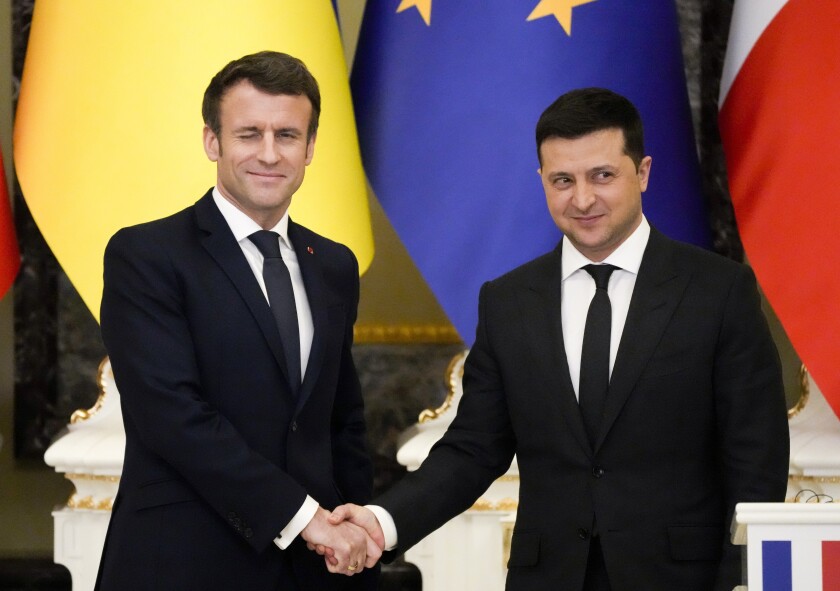Ukraine’s comic-turned-president finds himself in tight spot
[ad_1]
Volodomyr Zelensky, a comedian and jokester from Ukraine, was a well-known figure among his fellow Ukrainians. A comedy sketch artist, he starred in the hit sitcom “Servant of the People,” about a history teacher who somehow gets elected president on the strength of a viral video of him ranting about corruption.
Now, Zelensky really is Ukraine’s president, having won a shocking landslide victory as a political outsider in 2019, and Russia appears poised to invade his country at a moment’s notice. And no one’s laughing anymore.
Many Ukrainians begin to question whether the 44-year-old president of Ukraine has the intelligence and strength to guide them through such an uncertain time. Instead of “Servant of the People,” many here are thinking more of “The Godfather” and Michael Corleone’s decision to ditch his loyal but gentle lieutenant, Tom Hagen, in favor of a hardened “wartime consigliere” when the bullets start to fly.
Is it time, some Ukrainians ask, for Zelensky to be “Tom Hagened,” as the catchphrase spawned by the film has it?
“Since the beginning of the current tensions last year, Zelensky lost the public’s trust,” said Maria Zolkina, a political analyst with the Democratic Initiatives Foundation, a Kyiv-based think tank.
Zolkina observed that Zelensky had a higher level than any previous presidents during his first year and half in office. But that edge evaporated after Russia’s first troop buildup began last April, and polls now show that twice as many Ukrainians don’t trust him as those who do.
“This tells me that when the Russian threat became visible, Zelensky didn’t gain the trust from society he would have had they seen him as a wartime president,” Zolkina said.
With Russia thrusting Ukraine into a game of brinkmanship that could turn it into a bloody battleground, Zelensky is walking a tightrope amid increasingly dire U.S. warnings of Moscow’s biggest assault since the Cold War’s end, the goading of Russian President Vladimir Putin and a fragile economy ill-equipped to handle panicky investors.
This has created a rhetorical dissonance among Kyiv’s allies. While Washington and NATO insist on an invasion happening at any time, Zelensky counselled calm and demanded proof of a Russian attack.
“If anyone has any additional information about a 100% chance of an invasion, they should give it to us.… I have to speak with our people like a president and say the truth, and the truth is that we have different information,” he told reporters Saturday while observing police training exercises in southern Ukraine.

French President Emmanuel Macron winks after shaking hands with Volodymyr Zelensky, Ukrainian President, at a Tuesday news conference.
(Efrem Lukatsky / Associated Press).
“And now the best friend for enemies — that is panic in our country. It is only good for panic. It doesn’t help us.”
On Sunday, after Dutch airline KLM suspended flights to Ukraine amid news that flight insurers would no longer cover planes that enter Ukrainian airspace, the president’s office quickly jumped in, saying the government would underwrite insurance costs.
Zelensky himself has repeatedly scolded President Biden and other world leaders for pulling their diplomats out of Kyiv, saying they ought instead to act like captains who “should be the last to leave a sinking ship.”
“And Ukraine is not the Titanic,” he said at a news conference last month.
Zelensky is, in many ways speaking for his compatriots who are saying that Russian aggression is not a new threat. Since 2014, when Russia annexed Crimea and backed separatists in Ukraine’s east in a conflict that has since killed more than 14,000 people, many Ukrainians have become inured to the threats of their menacing neighbor.
But that hasn’t stopped criticism of Zelensky as a jester-turned-king wholly unsuited to the situation at hand.
“Zelensky was right in saying you don’t need this much unbalanced media attention” about a possible invasion, said Lada Roslycky, who heads the Ukraine-focused security consultancy Black Trident. “But the fact that he was so disrespectful to Biden caused additional tension — you don’t bite the hand that feeds you.”
It’s unclear how happy his international counterparts are with him either. The International Crisis Group has sent a large contingent of world leaders to Kyiv to support him. However, despite his public displays of goodwill, there are reports of frustration at the inconsistent messaging. Olga Oliker is the program director for Europe, Central Asia and Europe at the International Crisis Group.
Receive breaking news, analysis, and investigations from the Los Angeles Times right to your inbox
Los Angeles Times may occasionally send you promotional content.
Also, Zelensky’s team has been a frequently changing cast of both experienced and inexperienced officials.
“That makes it difficult for Western interlocutors, because it becomes a matter of ‘what happened to the person I talked to last week?’” Oliker said.
Zelensky, who was Russian-speaking and was famous for his comedy troupe Kvartal 95, described himself as an outsider against the establishment when he started his sensational election campaign in 2019. His platform centered on two main points: ending the war in the east in a way palatable to Ukrainians and breaking up corrupt oligarchs’ hold over the economy.
His plans for achieving those goals were not clearly defined, as he did not take part in any debates or give interviews. Still, with the public tired of the standoff in the east and the country’s floundering economy, Zelensky cruised to an easy victory over the incumbent president, candy baron Petro Poroshenko; his ragtag party — named Servant of the People, after his TV show — won a majority in parliament.
However, he had difficulty keeping his promises. Zelensky, an affable, small-bodied man who spoke in a quick-fire, cheesegrater voice and was easy to understand, did not bring peace. This angered proRussian Ukrainians, who viewed him as more emollient that Poroshenko.
Although he did pass some land reforms that have been important for rejuvenating the real estate sector, Zelensky’s fight against corruption was hardly a success, said Elina Ribakova, deputy chief economist at the Washington-based International Institute of Finance Critics.
“The biggest disappointment is that he hasn’t changed the fundamental structure of the government in Ukraine, which is still corrupted by oligarchs,” she said, adding that he failed to create institutional structures that could independently fight corruption rather than when it was “convenient for him as president.”
Critics highlight Zelensky’s use of sanctions against media mogul Viktor Medvedchuk, one of the leaders of the pro-Kremlin party Opposition Platform — For Life. Medvedchuk is friends with Putin, who is godfather to Medvedchuk’s youngest daughter.
Medvedchuk was charged with high treason by Ukrainian authorities in May. His television station was shut down. We placed him under house arrest
At the same time, Zelensky sidelined prosecutors who were making trouble for Ihor Kolomoisky, a famously combative oligarch who backed Zelensky’s election bid and owns the channel that broadcast “Servant of the People.” Kolomoisky was slapped with U.S. sanctions in March because of alleged corruption, but faces no legal trouble at home.
Zelensky also pursued Poroshenko on a host of charges including treason. Some say this smacks political opportunism at a time when there is a possibility of war.
Others complain about members of Zelensky’s inner circle, many of them comedy industry veterans with little experience in government, such as Andriy Yermak, a film producer and lawyer who currently heads the president’s office and who is seen as wielding outsize influence.
Zelensky was also known to issue populist decrees that may please the crowd, but do not achieve any substantive change. He promised to plant one billion trees and give away free smartphones to all Ukrainians over 60.
Still, even his most ardent critics — including former members of his staff — say his ascension to the presidency is proof that democracy is working in the country.
“In that sense I’m not disappointed,” said one former advisor who spoke on condition of anonymity in order to speak freely. “But I’m disappointed that he has no real program and has not organized his team. The retinue makes the king — and he has a bad retinue.”
Zelensky has the support of his office, which is a big help, despite all this, according to William Taylor, former U.S. Ambassador to Ukraine under Presidents George W. Bush or Barack Obama, and acting ambassador under the Trump administration.
“I’ve asked the question … what would happen if he were to call a meeting in his office of the leading political figures in the country — would they come? And the answer is unanimously yes, they would come,” Taylor said.
“They said explicitly, ‘He’s the president, he’s the one we’ve got right now. If there’s another election that will come in a couple of years, that will be different, but for today, he’s the one we have, and we need to support him.’”

